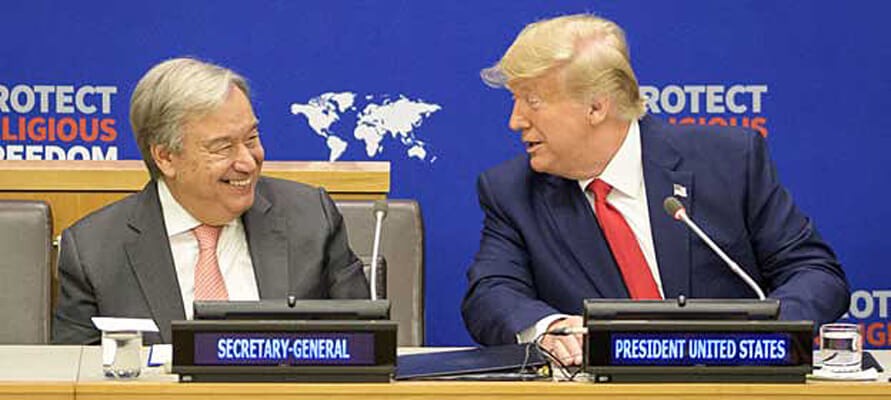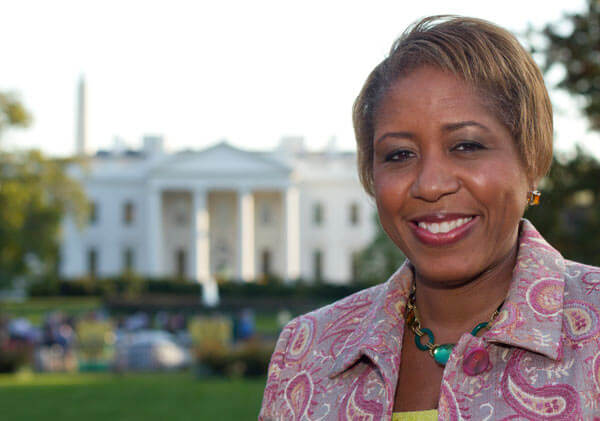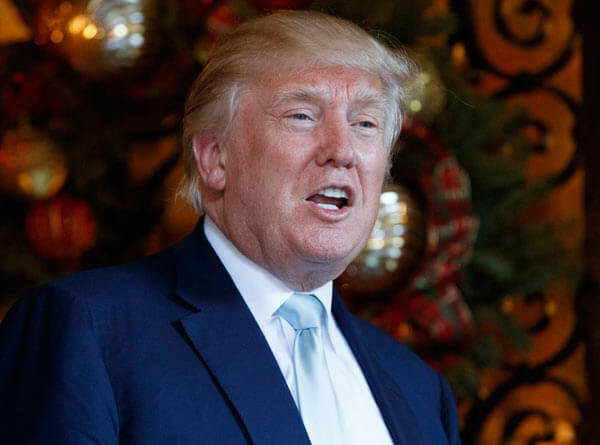– According to the mainstream narrative, President Trump’s incitement of his supporters during the certification of Joe Biden’s electoral victory led to the ‘insurrection’ at the US Capitol on Jan. 6, resulting in the banning of Trump’s social media accounts and his second impeachment by Congress.
According to so-called ‘conspiracy theories,’ however, the victory of the November Presidential elections was ‘stolen’ from Trump through electoral fraud and the storming of the Capitol was staged or allowed to happen in order to impeach Trump and prevent him from coming back to power in 2024.
It may be even more complicated; a report by the Swiss Policy Research website, for example, suggests that the right-wing QAnon movement, heavily supportive of Trump and prominent at the event, like Russiagate, is the product of an FBI psyop (psychological operation) launched to discredit Trump.
The public may never know the truth behind the Jan. 6 events, the mysterious ‘Deep State’ or the growing polarization between so-called pro-Trump white supremacist, ‘domestic terrorists’ and the anti-Trump multicultural, progressive liberals.
However, the search for peace, justice and democracy at this critical time requires transcending simplistic polarizations and understanding the systemic roots of the conflict that is tearing America apart.
Polarization
Donald Trump is a member of the ruling elite representing its own interests. His assaults on the environment and mismanagement of the Covid pandemic has put the entire country at risk. While claiming to represent the interests of the alienated and underprivileged white population, he introduced massive tax cuts and corporate deregulation worsening their social and economic position.
His rhetoric against minorities and immigrants has exacerbated racial and ethnic tensions and political extremism.
Joe Biden and the Democratic Party, heavily funded by the billionaire class, also represent elite interests at the expense of the general population. Under the Obama administration, economic inequality increased and Black poverty, mass unemployment and police brutality persisted.
The identity-focused rhetoric of liberals has stimulated racial and ethnic politics, and the rise of groups like Black Lives Matter (BLM). Often portrayed as progressive and “radical,” BLM has been significantly co-opted by corporate liberal interest and has received extensive funding from leading corporations including Amazon and Microsoft.
The corporate media has aided and abetted disunity and violence by silencing moderate and alternative voices that seek to understand and question the motives and strategies of both pro and anti -Trump extremists.
The polarization of politics and media hinder and mask an understanding and dialogue needed to move forward. For example, is there an equal risk of fascism, albeit more insidious, arising from the corporate liberals opposing Trump?
Reclaiming Perspective
A handful of corporations led by big tech and finance control the US political process and practically all aspects of society. The overwhelming focus on identity politics deflects attention from the dangers of deepening techno-corporate control and the destruction of freedom of speech.
The events of Jan. 6 have already contributed to plans for a federal law against ‘domestic terrorism’ and the criminalization of dissent, which would likely be based on the 2019 Confronting the Threat of Domestic Terrorism Act introduced by California Representative Adam Schiff. Anti-terrorism acts, such as the Patriot Act, are notorious for their use in crushing dissent and marginalized groups.
Systemic violence and repression are not new to the United States. The noble ideals of democracy, freedom and human rights aside, the United States was founded on plunder of the land and exploitation of people ¬– Native Americans, Blacks, Asians as well as underprivileged whites.
Likewise, the American Empire was established and maintained with systematic plunder and exploitation and massive military and political interventions around the world that continue today.
The costly military adventures (now up to 2021’s approved $740 billion military budget), along with global economic shifts such as manufacturing and job outsourcing and displacement by technology, impoverished large segments of the US population, both white and people of color.
Corporate deregulation and the decimation of labor unions weakened the working class and strengthened corporate authoritarianism. In recent decades, Republican and Democratic parties have differed little in their pursuit of corporate and imperial interests.
While the United States has had a history of social movements for people’s rights including labor and civil rights, recent initiatives for systemic change have experienced serious setbacks. The anti-globalization movement that came to prominence during the WTO (World Trade Organization) meetings in Seattle in 1999 was undermined by the Patriot Act (with Joe Biden being a key architect) and other policies introduced soon after the 9/11 terror attacks.
The Occupy Wall Street movement that emerged following the 2008 financial crisis and its slogan ‘We are the 99%’ brought attention to the excesses of the financial sector and growing economic inequality. But this movement also dissipated, largely due to state and corporate tactics of division, repression and propaganda to reinstate the narrative.
In the electoral realm, despite an unprecedented grass roots movement backing him, Bernie Sanders was blocked from winning the Democratic presidential nomination by the party elite in both 2016 and 2020.
The ideals of true socioeconomic reform have been squashed and subverted by the liberal establishment adopting the language of the progressive left but equating justice with racial and gender diversity and downplaying economic equality. This reframing channels the progressive energy away from threatening corporate control and profit, into a safe zone of identity politics, which only further divides and disempowers the general population.
Techno-oligarchy
Just as unemployed and uninsured Americans are pleading for support during the Covid crisis, the combined wealth of US billionaires ‘surpassed $1 trillion in gains since March 2020 and the beginning of the pandemic,’ according to a study by the Institute for Policy Studies.
The top five US billionaires – Jeff Bezos, Bill Gates, Mark Zuckerberg, Warren Buffett and Larry Ellison – saw their wealth grow by a total of $101.7 billion, or 26%, during this short period. The increasing digitalization of life during this period represent an enormous augmentation of the political and ideological power of the technocratic oligarchs.
Silicon Valley tech firms, financial supporters of Joe Biden, withdrew attention from issues potentially harmful to his campaign. Even some left-leaning media platforms like the Intercept refused to publish an article critical of Biden just before the election. It led its co-founder, investigative journalist, Glen Greenwald to resign from the Intercept.
Social media companies swiftly deleted the accounts of President Trump and thousands of others following the January 6 event in Capitol Hill on grounds that they incite violence and extremism.
While hate speech and incitement of violence should not be allowed, should a handful of unrepresentative, unregulated tech corporations, such as Facebook, Twitter, Google and YouTube exercise social and political control that exceed that of the state elected to represent people’s interests? Who decides what is appropriate and inappropriate and on what grounds?
Clearly, democratic policies and institutions are needed to oversee the First Amendment right of free speech. Elizabeth Warren, a candidate for the Democratic Presidential nomination, called for corporate accountability and planned to introduce policies for deregulation including the break-up of monopolistic companies like Facebook, Amazon and Google.
However, given lack of support from the dominant corporate wing of the Democratic party, Warren was not able to secure even the Vice-Presidential nomination over Kamala Harris, the choice of the liberal corporate establishment.
System Change
The mainstream narrative propagated around the world paints a rosy picture of a return to a post-Trump era of freedom and democracy with the Biden-Harris inauguration on Jan. 20. However, even if Trump is debarred from running for office in 2024, the attitudes and grievances of 70 million or more Americans who voted for him are unlikely to dissipate without serious efforts for change from those in power, and not just a return to corporate-dominated gesture-liberalism.
Indeed, all the issues of polarization and the inherent racism of society cannot be reduced to economic inequality and corporate dominance. Yet there has to be a recognition of the suffering and despair of ordinary people on both sides, be they incarcerated Blacks or unemployed whites.
As economic inequality deepens and the middle class disappears, vast segments of people of color as well as whites have become economically desperate and politically alienated from the status quo.
In the absence of genuine leaders to unite people and bring fundamental change, self-interested parties exploit and fuel discontent, anger and hatred by directing it towards each other. Use of epithets such as, ‘criminals and rapists’ against Latino immigrants by Trump and ‘basket of deplorables’ against Trump supporters by Hillary Clinton, have only fueled division and animosity.
Political ‘street warfare’ between the extreme right Trump supporters and extreme left antifascist groups is now a common occurrence across the US.
It is urgent that more and more people speak up and help move society beyond the polarization that is helping solidify techno-corporate totalitarianism and the police state. The us vs. them, good vs. bad dualism needs to be overcome with an appreciation of inherent human and planetary interdependence and the need for freedom and justice for all.
To quote the words of Robert F. Kennedy on the assassination of Martin Luther King, Jr. on June 6, 1968:
- “In this difficult day, in this difficult time for the United States, it is perhaps well to ask what kind of a nation we are and what direction we want to move in. [Y]ou can be filled with bitterness, with hatred, and a desire for revenge. We can move in that direction as a country, in great polarization…filled with hatred toward one another. Or we can make an effort … to understand and to comprehend, and to replace that violence, that stain of bloodshed that has spread across our land, with an effort to understand with compassion and love… What we need in the United States is not division; what we need in the United States is not hatred; what we need in the United States is not violence or lawlessness; but love and wisdom, and compassion toward one another, and a feeling of justice toward those who still suffer within our country, whether they be white or they be black.”

























